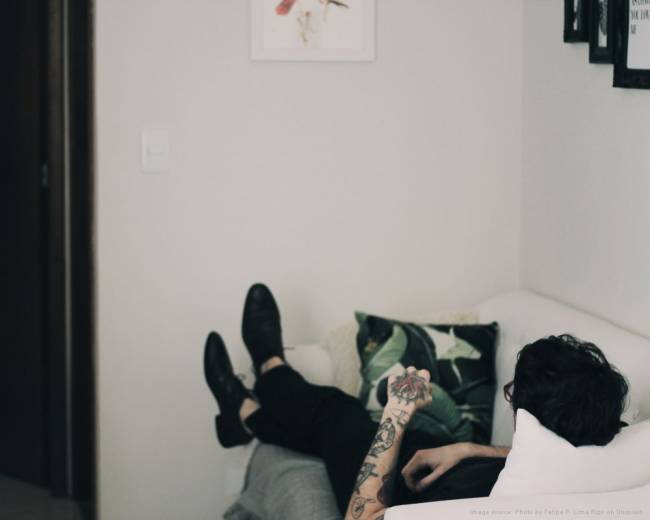If you’re constantly falling short on your Zzzzzs, you could need our 10 top tips for a successful slumber…

Sleep and exercise are inextricably linked. In an ideal world you’ll get plenty of each, but unfortunately the reality is very different for a lot of people, with recent research showing that only 14% of adults get their recommended seven-to-nine-hour quota of sleep every single night. More than one in five of the survey admitted they NEVER managed to get a full night of quality sleep under their belts.
This inevitably has a negative impact on our day-to-day lives. A separate survey found that “feeling tired” was the second most common reason for people skipping the gym (after “being too busy”).
While we’re not quite a nation of zombies, it’s clear that we have a problem. But how can we overcome it? We asked a number of experts to give us 10 foolproof ways to get more sleep. Here’s what they came up with…
1. Don’t listen to those who tell you not to eat before bedtime
DW Fitness Club’s resident health and fitness expert, Carly Tierney, is keen to dispel the myth that eating before bedtime can hinder your ability to sleep. While you might want to avoid anything too heavy – scoffing a quarter pounder and large fries 10 minutes before you hit the hay is just silly – a late-night snack isn’t necessarily a bad thing. “Contrary to common belief, eating late at night is not bad for you. I always have a snack about an hour before bed. Something slow-releasing like Casein protein, oats, or fat-free cottage cheese. This helps with the recovery process overnight and kick-starts my energy levels for the following day,” says Carly.
2. Go easy on the booze
While you may think that several double vodkas will help you to drift off at night, any expert will tell you that alcohol ultimately lowers your chances of having a good night’s shut-eye. Dr John Larsen, Director of Evidence and Impact at alcohol education charity, Drinkaware, explains the science.
“Drinking alcohol before bedtime can make you go straight into deep sleep and miss out on the first stage, called rapid eye movement (REM) sleep. As the alcohol wears off you will come out of the deep sleep and be more likely to wake up. You would normally have six or seven cycles of REM helping you to feel refreshed, however, if you’ve been drinking, you’ll typically have only one to two.”
3. Talk to yourself!
We’ve all been there. As soon as your head hits the pillow, you start to think about all of the bad things that have happened to you.
According to Lisa Artis, spokesperson for The Sleep Council, talking to yourself can actually help you to eliminate negativity and settle down for a good kip.
“Don’t think negatively. Say positive thoughts out loud, and write them down. Speaking out loud stops you thinking! Why not keep a sleep diary? If you find dropping off hard, it may be interesting to see what you’ve been doing, what you’ve eaten and where you’ve slept on the days you sleep and don’t sleep well,” she remarked.
4. Set an earlier coffee cut-off point
There’s nothing wrong with drinking a few coffees to perk you up. In fact, Carly tells us that she regularly drinks a black coffee pre-workout in order to give her extra mental focus. However, we all know that too much coffee is bad for us. It could also be preventing you from getting to sleep.
Carly adds: “Be mindful not to consume too much caffeine late at night. Try cutting out the caffeine after 2pm and see if that makes a difference.”
5. Eat your beans (as well as your greens)
There are plenty of foods to help you sleep. Alison Cullen, a Nutritional Therapist, tells us that increasing your intake of fibre can help to improve your slumber.
“Eating food that is high in saturated fat and sugar and low in fibre is associated with sleep that is lighter, less restorative and more disrupted. Research shows that increasing fibre intake improves the amount of time spent in deep, slow-wave sleep,” she says.
6. Go bananas and make yourself a “sleep sandwich”
Speaking of foods that make you sleepy, here’s an unusual diet-focused tip that admittedly might not be to everyone’s taste.
The Sleep Council’s Lisa Artis tells us: “The Romans thought that lettuce was good for sleep, but the crème-de-la-crème ‘sleep sandwich’ has to be a banana, Marmite and lettuce butty. The banana is an excellent source of magnesium and potassium, which help to relax overstressed muscles. They also contain all-important tryptophan to stimulate production of those key brain-calming hormones. And Marmite also contains natural substances that help induce sleep.”
7. Get into a routine and set a deadline on screen time
If you don’t believe in the Circadian Rhythm (otherwise known as the Body Clock), just speak to somebody who is desperately trying to get back to normal after working night shifts all week. They’ll tell you all about it! All of the experts that we’ve spoken to point out the benefits of having a regular bedtime routine.
Carly says: “Switch off electrical items a few hours before bed. Surfing Instagram for fitspo can be counterproductive. That time would be best used getting some shut eye.”
8. Bring your cardio workouts forward
Exercise and sleep, along with diet, are crucial to your overall wellbeing. You need sleep to help repair the muscles that you’ve been working on at the gym, and on the flip-side, there’s strong evidence to suggest that regular physical activity results in better-quality slumber.
However, don’t leave your cardio workouts too late. Carly warns: “If you have trouble sleeping, don’t exercise too late at night – your body and mind need time to relax.”
9. Give yoga a try – the scientists say so!
While we’ve established that you should avoid heavy cardio workouts right before bed, there are plenty of people who swear by late-night yoga.
Research published in the Journal of Ayurveda and Integrative Medicine shows that elderly people in particular can benefit from better sleep by adding yoga into their daily schedules. One theory behind this, the report notes, is that yoga helps to stretch and relax the muscle,s “causing significant physical and mental exertion, resulting in less sleep latency, more deep sleep, less sleep disturbances, and better sleep efficiency”.
10. Up your napping game
OK, you may think that sneaking in a two-hour nap in the middle of the day will make it harder for you to get your full quota of sleep that night, but this isn’t necessarily so.
Recent reports have highlighted the benefits of “segmented sleeping”, where instead of cramming in eight hours of sleep in one go, we break this down across the course of the day. It also raises the question, are naps a good idea? Carly believes so.
“I’m all for a nap pre-workout. If I’m tired, I try to respond to what my body is telling me rather than fight it. If a pre-workout nap leads to a better workout consistently, then by all means nap. If it leads to poorer workouts, don’t nap until after your workout is done,” she commented.








